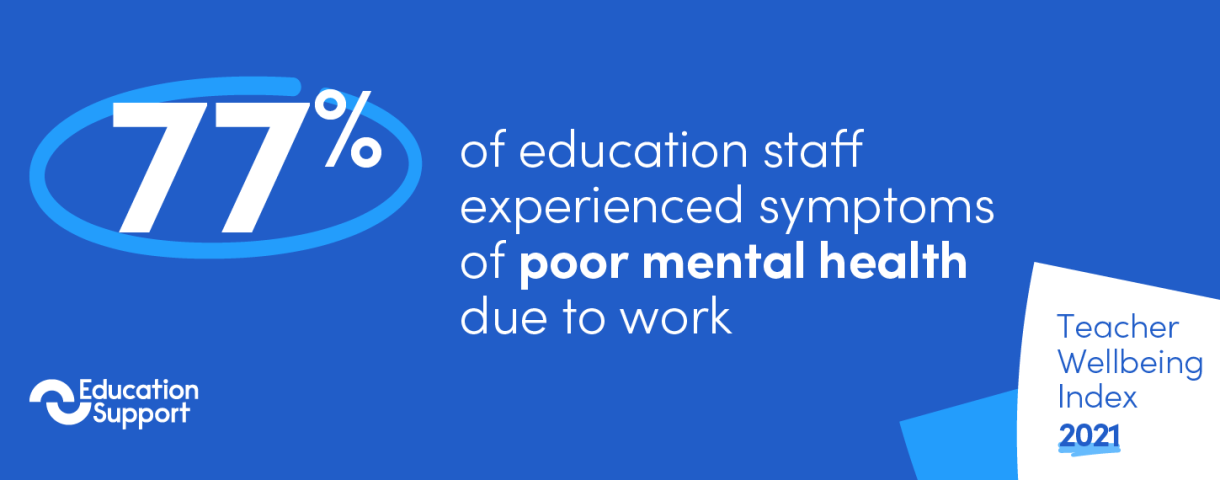by Sinéad Mc Brearty, CEO of Education Support
We know that things never really went ‘back to normal’ in schools. When wider society returned to clubs, pubs, and family gatherings, schools remained at the heart of the pandemic. You’re now facing the uncertainty of the Omicron variant, with increasing positive tests among colleagues and pupils. This is all while trying to deliver on the education recovery agenda, and Ofsted inspections begin again. The severity of the new wave is undetermined, but you might be feeling a familiar kind of anxiety.
Teachers and education staff have continually prioritised the children you’re responsible for guiding and inspiring. This has come at great personal cost to many of you. We know from our latest Teacher Wellbeing Index, launched in November, that stress rates are consistently high, symptoms of poor mental health are on the rise and many report wanting to leave the profession. 77% of education staff reported experiencing symptoms of poor mental health due to work in 2021, rising to 84% for senior leaders. The cost of an unwell education workforce is simply too high for our society – at any time, but especially right now!
This year’s Teacher Wellbeing Index also shows that over three-quarters of all teachers (including senior leaders) join the profession with a clear sense of purpose. The two most commonly reported drivers of a sense of purpose are: ‘making a difference’, and ‘helping students to make progress or achieve their goals’. Despite the challenges of the last two years, a massive 90% of teachers with a sense of purpose say they still feel connected to it.
This remarkable statistic is heartening, and goes some way toward explaining how you have all demonstrated such resilience and dedication throughout the pandemic. Much has been written about how educators with a clear sense of purpose can be more motivated and may even see a benefit in their students’ outcomes.
Those with a clear sense of purpose, however, may struggle to say no, or ignore cues from their body to take a much needed rest. Does this sound familiar?
Working at maximum capacity and constantly stretching to manage workload is not sustainable in the long run. Ongoing stress, anxiety and fatigue can lead to burnout. Burnout is a collection of symptoms of poor mental health, built up over time, and it’s vital that you are able to identify it. Burnout can rob talented leaders of their energy and sense of purpose in the classroom.
While the mental health and wellbeing of the profession must be meaningfully tended to by schools and the Government, you have a role to play too. Be sure to watch out for these signs in yourself and colleagues:
- Persistent fatigue
- Developing apathy, numbness or a cynical attitude
- Emotional outbursts from bottled-up emotions
- Unusual performance issues, including a lack of focus or struggling with work relationships
If you are headed towards – or already – feeling burned-out, consider the following three points.
1. Know your priorities – it’s ok to say no
Be clear about your own priorities at work. Perhaps they are shaped by your own sense of purpose? Practice holding healthy boundaries that stop you from taking on too much, or committing yourself to work that doesn’t align with your priorities. It can make a real difference to your levels of stress and exhaustion.
2. Nourish yourself – it’s not selfish
It’s essential to find time to do the things that feed your sense of self. Being a school leader is demanding and has a significant caring dimension. Don’t forget that you’re a person beyond the job, with passions and interests. It might feel impossible, but making time for our passions gives our lives meaning, energises us and prevents burnout.
3. Get support – it’s a sign of strength
Asking for support at the right time is vital. Don’t suffer alone if you feel like you’re heading for burnout. In an ideal world you’d raise issues with your line manager, and co-create a plan for tackling what’s affecting you. But life isn’t always ideal. Talking to a trusted friend or colleague can be a really important first step.
Don’t forget that Education Support is always here for you. As an NAHT member, you can access their dedicated, confidential counselling and support helpline on 0800 9174055. Open 24/7, it is staffed by qualified counsellors and offers you emotional and practical support. You can find out more about the support provided by Education Support to NAHT members here.
You can view Education Supports full Teacher Wellbeing Index here.
Call us, we’ll listen.

